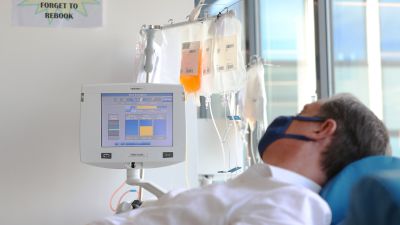Blood plasma donations for medicines taken in Midlands for first time in 20 years

Centres in Birmingham, Coventry and Wolverhampton have begun to take donations of blood plasma to be used in the manufacture of medicines for people with rare immune diseases.
The centres had been created to get blood plasma donations for coronavirus antibodies, but have now been repurposed to gather blood plasma for use in the manufacture of medicines.
It comes after the government lifted a ban in February that had been imposed on UK donors in 1998, amid concerns about the spread of a human variant of mad cow disease.
Currently, more than 17 thousand people across the UK are in need of these antibody-based medicines - called immunogobulins.
Volunteers can donate at 14 centres across the country from Wednesday, and the service will run initially for three months.
The first person in the country to donate blood plasma this morning was Martin Rengger, 51, who was pictured at the Twickenham hub in West London.
He described the process as "so easy", having already donated Covid plasma a number of times at the same place.
"I think it's nice to be able to do something and hopefully help somebody that needs it," he said.
A global supply shortage and rising demand meant the UK previously depended on imports of blood plasma from other countries.
More than 1,500 people, drawn from an existing blood donor base, are booked in to donate in the first week across the 14 centres - including Wolverhampton, Coventry and Birmingham.